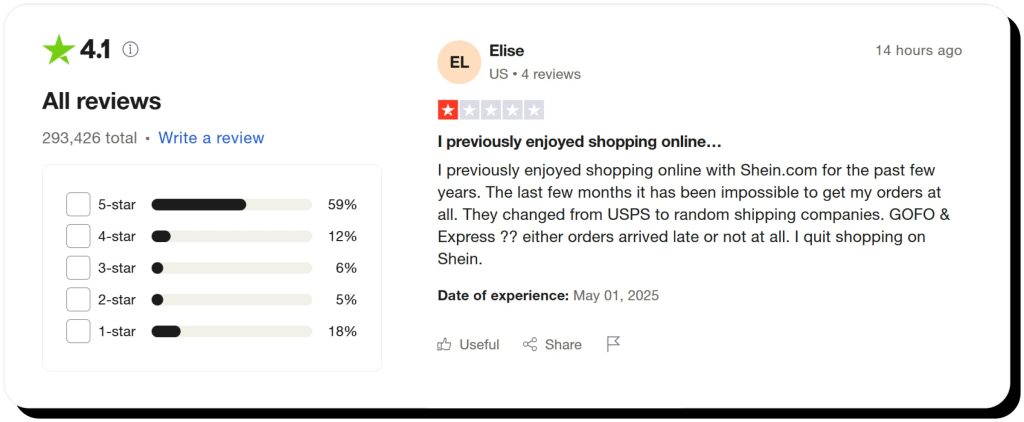Is Shein safe? What you should know about the fast fashion giant

Get a quick summary in ChatGPT.
Shein is generally considered safe for shopping, but there are concerns around the company’s data privacy, product quality, and ethical practices. While most shoppers love Shein’s ultra-low prices and receive their orders without issue, some report inconsistent sizing, delayed shipping, and intrusive app permissions. Others allege that some Shein products contain toxic chemicals.
Let’s dive into what stands behind those claims and see why Shein is safe enough to shop.
What is Shein?
Pronounced “She-In,” Shein is a “fast fashion” ecommerce platform that specializes in women’s clothing. It also sells fashion accessories, jewelry, electronics, home and kitchen products, and men’s and children’s clothing. These products are shipped directly from Chinese manufacturers or one of Shein’s global warehouses to more than 150 countries worldwide. For example, Shein has U.S.-based warehouses in Whitestown, Indiana, and Los Angeles, California.
The company is known for bargain basement pricing, with many dresses selling for under $10 and some tops going for less than $5.
Shein is particularly popular with Gen Z. In fact, eMarketer states that 44% of Gen Z consumers buy at least once from Shein each month, and Financial Times reports that over 25% of Gen Zers in the U.S. and U.K. said they had used the app over the preceding 30 days.
Is Shein legit?
Shein is a legitimate company founded by Chris Xu. The company was established under the name ZZKKO in 2008, changed its name to Sheinside in 2012, then became Shein in 2015. Originally based in China, Shein is currently headquartered in Singapore.
Business model and reputation
Shein has a unique business model in that it tests new products in small batches–making only 100 to 200 items–then analyzes sales data and customer feedback to determine what to restock.
The company achieves ultra-low prices through a direct-to-consumer approach that cuts out middlemen and enables the de minimis tax break on U.S. imports. It also controls its supply chain by working with a network of Chinese manufacturers, uses low-cost materials, and heavily employs automation.
While aggressive digital marketing and low prices have helped Shein soar in popularity, the company has also faced allegations of unethical business practices, including:
- Forced labor
- Poor working conditions
- Toxic chemicals in products
- Child labor
- Intellectual property theft
- Environmental hazards
What customers are saying
Customer reviews are mixed and vary depending on the review platform. Many love Shein’s low prices, but some say shipping times are slow and customer support could improve.
At the time of this writing, Shein had a:
- 4.1-star rating out of 293,426 reviews on Trustpilot
- 1.8-star rating out of 4,926 reviews on Sitejabber
- 1.9-star rating out of 1,582 reviews on Reviews.io
Though Shein is not Better Business Bureau accredited, it has an “A” BBB rating yet more than 3,000 complaints in the last three years.

Is it safe to order from Shein?
It’s safe to order from Shein in the sense that the company follows industry standards to encrypt transactions and protect credit card information.
The company also states it does not directly sell personal information to third-party companies (though it admits some of its data-sharing practices–such as sharing data with advertising and marketing partners–could be considered selling data).
However, there are some legitimate concerns about using Shein:
- The company isn’t completely transparent about what partners it shares user data with, and what those partners do with the data
- In 2018, 39 million Shein customers were involved in a data breach
- Products laden with toxic chemicals can’t be safe, even if the ordering process is
Shein says it has tightened its security protocols since the data breach, including complying with ISO standards, undergoing third-party audits, and rewarding users who report vulnerabilities. The company also started conducting product safety tests.
Product quality and returns
It’s no secret that the cheapest products typically aren’t of the highest quality, and Shein does face criticism over low-quality products.
That said, most products can be returned within 30 days of their delivery. Returning the first item from an order is free. However, returning additional items from the same order comes with a $7.99 shipping fee. Some products aren’t eligible for returns, including lingerie, jewelry, cosmetics, and pet products.
To make a return:
- Sign in to your account and navigate to “My Orders”;
- Find the order in question and click “Order Details”;
- Find the item you want to return and click “Return Item.” Then follow the prompts.
Shipping delays and customs
Shipping delays are among the most common frustrations mentioned by Shein buyers. According to the company’s shipping page roughly 60% of standard shipments are delivered within seven days and 73.83% of express shipments are delivered within 8 days.
In some cases, shipments can be delayed due to high order volumes, problems with the carrier (such as lost or misplaced packages), or even holdups in customs, which is, admittedly, outside of Shein’s control.

Customer support reliability
Shein offers live chat and promises a response to support tickets within 24 hours, but some people state they have trouble getting a live person to chat with, struggle to get refunds, or experience slow or no responses.
Is the Shein app safe?
From a payment perspective, the Shein app is as safe as other major ecommerce platforms, though there are concerns about data collection. More specifically, why the application gathers so much information (even that not necessary for making a transaction) and who it shares it with.
The Shein app requests permission to access your location, camera, photos, calendar, and microphone, though these are optional. The app also collects:
- Personal information: Email address, physical address, phone number, user ID, driver’s license number, social media
- Body type: Shape, measurements, and clothing sizes
- Device identifiers and network activity: IP address, mobile carrier, system configuration, keystroke patterns
- Purchasing behavior
- Search history
- Communications with Shein: Texts, chats and emails
- Photos, videos, and audio uploaded to Shein
In addition, the company builds user profiles with data it gets from commercial data brokers.
Shein shares some of the data it collects with third-party sellers and uses it for targeted advertising. While its Privacy Policy outlines the categories of third parties, there’s no specific list of entities.
Additionally, even if Shein encrypts data, it’s possible for third parties to leak that data or get breached, and in 2022, Shein’s former parent company, Zoetop, was fined $1.9 million for lying about a data breach that affected 39 million customers in 2018.
Payment security on Shein
Shein accepts major credit cards (including Visa, MasterCard, American Express), PayPal, Venmo, and Cash App. The shopping platform also accepts installments through Afterpay, Klarna, Affirm, and ZiP.
Shein encrypts transactions, which hides your payment data, and follows Payment Card Industry’s Digital Security Standard (PCI DDS) standards to protect consumer credit card data. Because of this, it’s considered as safe as any other major ecommerce platform to use your credit card.
However, PayPal and virtual cards can add another layer of safety on Shein. PayPal offers buyer protections (though so do most credit cards), and virtual cards ensure Shein never sees your actual credit card information.
How to protect your data and privacy when shopping online
Follow these tips to protect your information and privacy when shopping on Shein or any other online store.
Double-check the URLs
Make sure you shop only on secure websites. For that, check the URLs for the “https” at the start or the padlock icon in the browser address bar.

Use dummy data whenever possible
To protect your personal information from being exposed, use dummy data when possible instead of your real details. For example, create an email address to use specifically for online shopping and don’t register with your primary one. Also, ecommerce sites don’t really need to know your date of birth or phone number.
Limit permissions on apps
Only allow permissions required to use their services. For example, there’s no need to allow Shein to track your location or access your photos.
Stay alert for phishing and smishing scams
Never respond to unsolicited emails or texts claiming to be from Shein and other apps. If you receive an unexpected message, log into your account or contact customer service directly to ensure it’s legit. Avoid clicking any links outside of the official website or app—they may look legit, but actually take you to a malicious page instead.
Set up strong passwords and 2FA
Very strong passwords and two-factor authentication will prevent bad actors from accessing your accounts.
How Onerep can help reduce online exposure
For a believable scam attack, criminals need to know a little more about you than your email address. You’re more likely to interact with an email or phone call that states your name, home address, and other personal details.
Data brokers are a well-known source of such details. These sites aggregate your personal information from various sources, including ecommerce platforms, and publish it online for anyone to access. Just by looking up your name, anyone interested can find where you live, how much you earn, what your hobbies are, what your estimated credit score range is, and much more.
Onerep removes your personal information from 230 data broker sites, taking it out of the scammers’ hands. The service finds the exact pages where your data is exposed and sends opt-out requests on your behalf. Once removals are completed, Onerep keeps monitoring the websites in case your information reappears to deal with it at once.
FAQs
Is Shein trustworthy?
Shein is a legit ecommerce platform, and most orders are delivered on time. However, there are concerns surrounding the data Shein collects and who it shares it with. Additionally, many people mention that the quality of products is low and may even contain toxic materials.
Is the Shein app secure to use?
Generally speaking, the Shein app is secure to use because it encrypts transactions and follows credit card protection standards. However, the app tracks user behavior and requests unnecessary permissions.
Is Shein safe to order from?
Shein is safe to order from, but there are concerns surrounding which companies it shares data with, what they do with that data, and potentially toxic chemicals in some products. Also, there are inconsistencies in sizing and received products may differ from what was expected based on the product description.
Is Shein safe for credit cards?
It’s as safe to use your credit card on Shein as on other major platforms. However, you can add an extra layer of security by using a virtual card or a service that offers buyer protections, such as PayPal.
How does Shein handle returns or refunds?
Shein accepts returns for most products within 30 days of delivery. The first item is free to return, but there is a $7.99 shipping fee for each additional item. Shein issues refunds to the original payment method or the refund method you select.
Is Shein a scam?
No, Shein is not a scam. It’s a legitimate ecommerce company, and most users receive the products they order. However, you need to shop mindfully and carefully read product descriptions and reviews in order to avoid low-quality products.





Mark comes from a strong background in the identity theft protection and consumer credit world, having spent 4 years at Experian, including working on FreeCreditReport and ProtectMyID. He is frequently featured on various media outlets, including MarketWatch, Yahoo News, WTVC, CBS News, and others.